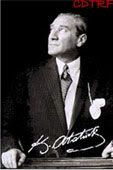A bird's eye view
The results also show that democracy is making a fast recovery in the United States and that the American humans can no longer tolerate restrictions to their individual freedoms. It was also a message of discontent not just with the Bush man's policies over Iraq but with the Republicans' control of Congress, which left the president able to operate without any restraint from the legislative authorities. The first practical result of the elections was the resignation of the Rumsfeld man, something that should have taken place a long time ago, since he represented a misfought war. The Frank Rich man, in an article published in the International Herald Tribune on Nov. 13, describes the outcome of the elections in a very eloquent way. We quote some excerpts: "Of course the thumping was all about Iraq. But let us not forget Katrina. It was the collision of the twin White House calamities in August 2005 that foretold the collapse of the Bush Presidency. Back then, the full measure of the man finally snapped into focus for most Americans, sending his poll numbers into the 30s for the first time. The United States saw that the president who had spurned a grieving wartime mother camping out in the sweltering heat of Crawford was the same guy who had been unable to recognize the depth of the suffering in New Orleans' fetid Superdome. This brand of leadership was not the ?compassionate conservatism? that had been sold in all those photo ops with African-American schoolchildren. This was callous conservatism, if not just plain mean.? Well said, Mr. Rich man, and bravo to the American humans who reacted in such an effective way to safeguard their democracy.
We birds welcomed the hosting in our city on Nov. 13 and 14 of the Alliance of Civilizations, which is an initiative by the Erdogan man and the Zapatero man in improving relations between the West and Islam. We were also happy to see that the Kofi Annan man and the Khatami man were also present at this important meeting. What we, however, could not understand, was the absence of Patriarch Bartolomeos, who, in his wisdom had initiated dialogue between Christianity and Islam from 1992. His experience from this on-going dialogue would have greatly contributed to the meeting of the Alliance of the Civilizations. But this was not the case. Maybe another time!
We have nothing more to say about the ongoing crisis between Turkey and the EU. We would just like to quote the last paragraph of our column of Oct. 9 last year. "Some bird-brained advice is once again necessary for the Turkish human administration. The best way to get your revenge on the way that the EU treated you these last few days is by doing what the EU does not expect you to do. And that is to start implementing everything that you have been told to implement. In that way you will deprive the EU of the pleasure of finding a reason to further delay your accession negotiations. That should be your primary objective. Your second objective should be to start a campaign to charm the public opinion of the EU. We know from the past that you are good at that. It is imperative in the next 10 years of negotiations that you change the negative opinion that the European humans have about Turkey. This will also influence in a positive way the positions of the EU governments. Only by doing that will the humans of Turkey be able to enjoy one day the freedom of the birds."
Ponder our thoughts, dear humans, for your benefit.



